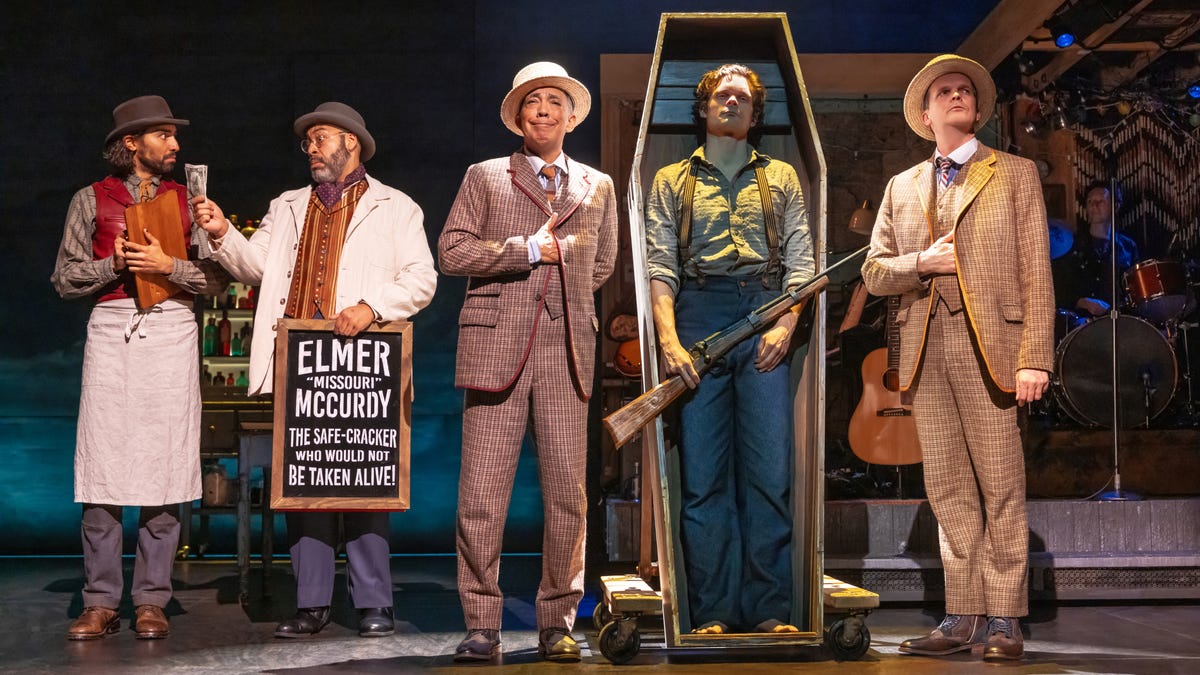NEW YORK — Who needs a defibrillator when you have “Dead Outlaw?”
David Yazbek’s latest curio, which opened April 27 at the Longacre Theatre, is a waggish, walloping, what-in-tarnation musical; the sort of coup that is so sublimely strange and strangely profound, it will revive your faith in Broadway itself.
That’s a whole lot of words for a show where the lead character spends half the 100-minute runtime with his mouth pursed shut in a casket. But that’s also part of its genius. “Dead Outlaw” is based on the unbelievable true story of Elmer McCurdy (Andrew Durand), a haplessly inept train robber who was born in 1880, died in 1911, and buried in 1977.
After he was gunned down by police, McCurdy’s body laid unclaimed in an Oklahoma funeral home for months. Embalmed with liberal amounts of arsenic, he was eventually propped up and put on public display, with looky-loos paying two bits to gawk at the so-called “bandit who wouldn’t give up.”
But McCurdy’s story didn’t end there. For decades, his mummified corpse was passed around and sold into traveling carnivals, wax museums and exploitation movies, ultimately landing at an amusement park in Long Beach, California, where McCurdy’s body was painted flaming red and strung up in a haunted house. The macabre details of how his remains were discovered and identified are all revealed at the top of the show, which traces his wild, woebegone journey from Jesse James wannabe to neglected carrion.
“Dead Outlaw” is ingeniously directed by David Cromer, whose production is arrestingly lit by Heather Gilbert, with kooky, homespun scenic design from Arnulfo Maldonado. The narrative unspools like a spellbinding campfire tale, as a six-piece band – led by the gruff yet inviting Jeb Brown – unleash a maelstrom of mandolin- and banjo-laden earworms, from McCurdy’s snarling barnstormer “Killed a Man in Maine,” to the sultry stick-‘em-up “Indian Train.”
The electrifying score, written by Yazbek and Erik Della Penna, is pure, undistilled Americana, but with the scorching rock edge of “Passing Strange” and the mordant, satiric delights of “Little Shop of Horrors.” In “Up to the Stars,” a coroner (Thom Sesma) croons Dean Martin-style atop his autopsy table, musing how even the most sensational deaths all come down to forensic pathology in the end.
And in the sweet-and-sour “Millicent’s Song,” a teenage misfit (the phenomenal Julia Knitel) divulges her youthful fears and yearnings to the lifeless McCurdy, who’s been stashed in her living room by her filmmaker dad. As the girl prepares to leave home, she confesses her unwonted envy for the felonious crowbait: “You get to stay the same / and I wish that I could, too / growing up ain’t as easy as it seems.”
Durand delivers the most indelible performance of the season as McCurdy: motionless, flat-eyed and unblinking as he stands upright in a wooden coffin for much of the show, reduced to a rifle-toting rag doll. It’s a mind-blowing physical feat, to be clear, but he also imbues the tetchy character with a potent, devastating undercurrent.
As imagined by playwright Itamar Moses in his incisive yet humane book, McCurdy was someone who longed to make some sort of mark on the world, but he had neither the good fortune nor the skills to achieve much of anything. The harsh reality is, most of us aren’t destined to be revered or remembered, and it’s impossible not to take pity on our perished desperado as he’s continually chewed up and discarded as a trifling sideshow oddity.
When the clock finally runs out, all we really hope for and deserve is some peace. That futility, and tragedy, is poignantly rendered in Durand’s stiff, cold hands.
In the staggering “Dead Outlaw,” death is both commodified and desensitized; a cruel fact of life that we are pummeled with repeatedly throughout the musical. (“Your friends are dead / your dog is dead / and so are you,” Brown growls in the cheeky, name-dropping finale.) But in facing our bleak mortal coil with a laugh and a song, McCurdy’s hair-raising, pulse-racing resuscitation helps us all feel a little more alive.
“Dead Outlaw” is now playing at the Longacre Theatre (220 W. 48th Street).

Leave a Reply